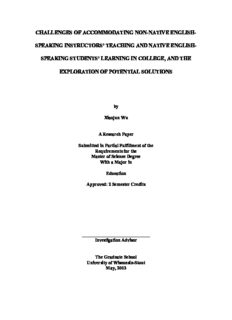
Challenges of Accommodating Non-native English-speaking instructors' teaching and Native PDF
Preview Challenges of Accommodating Non-native English-speaking instructors' teaching and Native
CHALLENGES OF ACCOMMODATING NON-NATIVE ENGLISH- SPEAKING INSTRUCTORS’ TEACHING AND NATIVE ENGLISH- SPEAKING STUDENTS’ LEARNING IN COLLEGE, AND THE EXPLORATION OF POTENTIAL SOLUTIONS by Xiaojun Wu A Research Paper Submitted in Partial Fulfillment of the Requirements for the Master of Science Degree With a Major in Education Approved: 2 Semester Credits ______________________________ Investigation Advisor The Graduate School University of Wisconsin-Stout May, 2003 ii The Graduate School University of Wisconsin-Stout Menomonie, WI 54751 ABSTRACT Wu Xiaojun (Writer) (Last Name) (First) (Initial) Challenges of Accommodating Non-native English Speaking Instructors’ Teaching and (Title) Native English Speaking Students’ Learning in College, and the Exploration of the Potential Solutions Education Asst. Prof. Jill Stanton May, 2003 82 (Graduate Major) (Research Adviser) (Month/Year) (No.of pages) American Psychological Association (APA) Publication Style (Name of Style Manual Used in this Study) A continuing growth of non-native English speaking (NNES) instructors hired by American universities has been substantial in recent years. Their presence on campus has brought more diversity into both the academic and university culture. However, currently most of the foreign scholars working in American universities come from countries where English is not used as a native language. Due to the differences between their cultural backgrounds and the American mainstream cultures, major adjustments are needed for both NNES instructors and students in their university lives. This study was iii intended to identify the key components of the obstacles and challenges faced by both NNES instructors and students in an academic college setting. It also investigates the coping strategies of students applied to adapt to the teaching styles of NNES instructors and maintains their study quality. Investigation of the strategies and techniques applied by NNES instructors to improve teaching quality and enhance student-instructor relationships, and exploration the potential solutions to improve classroom quality and the relationship between the two parties was also done. Both interviews and a focus group were used in this research. The interviews were designed to be used as an instrument for the study of opinions from instructors, while the focus group was used to collect input from students. Both NNES instructors and students in this study held relatively positive views on issues related to this growing phenomenon. The challenges NNES instructors have encountered often fell into areas related to student acceptance of diversity, their communication proficiency, classroom culture adjustments, student motivation, conformability of students and classroom organization. For students, the challenges included high expectations by their NNES instructors, communication difficulties due to accents, and different communication styles. The researcher also found that connections actually existed between the challenges perceived by NNES instructors and the challenges of their students. Non-native English speaking instructors often encounter challenges in the classroom and student management. As they strive to pursue career excellence and foster better future professionals, they have to challenge, what is perceived to be, the passivity of the average American student. While American students are attempting to maximally absorb knowledge from their NNES instructors, they also have to face the unfamiliar elaborated expectations from their instructors. iv Several strategies were found by the interviewees and student participants, which can be useful in resolving the above issues. Recommendations are suggested from the aspects of NNES instructors, students and university administration. v Acknowledgements I wish to express my profound gratitude to Assistant Professor Jill Stanton for her advice, invaluable assistance and guidance in preparing this manuscript. Because of the dedication, patience and understanding, educational and emotional support, and sincere encouragement from Assistant Professor Jill Stanton, I was able to complete this project with critical thinking and finish the Master’s degree study successfully. I would like to express my sincere appreciation to Marie T Gabert for her undivided attention and priceless assistance in the completion of my thesis. Finally, I thank for all those who in one way or another participated and contributed to the success of this study. vi Table of Contents Page Abstract……………………………………………………………………………... ii Acknowledgements …………………………………………….…………………. v List of Tables ……………………………………………………….……………... x List of Figures …………………………………………………………………….. xi Chapter I Introduction …………………………………………………………..…… 1 Statement of the Problem ……………………………………………..…... 1 Objectives …………………………………………………………...……... 2 Definitions…………………………………………………………..……... 3 Limitation ………………………………………………………..………... 4 II Review of Literature ………………………………………………..……... 5 Increasing enrollment of foreign students in universities……….…………. 5 Student enrollment in graduate programs……………….………………….. 7 Lack of employment interests in academic fields………….……………..... 8 Demographic status of international scholars……………………………… 9 Increasing requirements for teaching quality…………………………..…. 9 Positive perspectives…………………………………………..………..…... 10 Existing Dilemmas……………………………………….……..……..……. 11 Communication difficulties due to accents……………..…………... 11 Language proficiency ……………………………………..………... 12 Oh! No Syndrome...………………………………………..……….. 14 vii Pedagogical methods due to different classroom culture………….. 15 Onus only on instructors………………………………………….... 19 Adaptation to students’ learning style ....……………………….…. 19 Dealing with students’ expectation in learning………….……….... 20 Potential solutions..………………………………………………………… 20 Extensive training of teaching skills.……………………………… 21 Training in teaching and communications……………………….... 22 Applying story telling in teaching…………………………………. 23 III Methodology…………………………………………………………..…… 25 Introduction…………………………………………………………….…... 25 Subject description……………………………………………..………….. 25 Procedure………………………….……………………………………..…. 26 Interview………………………………………….………………… 27 Focus Group ……………………………………………………….. 28 Data Collection……………………………………………………….……. 29 Data Analysis…………………….………………….…………….……….. 29 IV Results and Discussion ……………………………….………………….… 31 Overall perception………………………………………………..………… 31 Challenges for NNES instructors and the potential solutions.…………..…. 32 Student acceptance………..…………………………………..……. 33 Communication skills and techniques..………………………..…… 35 Different classroom culture……………………………..………….. 38 Motivating students……………………………………………….. 39 viii Students’ conformability to formality..……………………………. 41 Challenges for students and the potential strategies………………………... 42 Higher expectations…….………………………………………….. 43 Communication difficulties………………………………………... 43 Communication style…...………………………………………….. 45 Connection between the challenges for students and instructors…………... 46 Building student-teacher relationship………………………………………. 47 Participation of university administration in enhancing college environment…………………………………………………………………. 48 Training in overcoming cultural difference………………………... 49 Enhance communication training………………………………….. 49 Pedagogical methods training……………………………………… 50 V Summary and Conclusions………………………………………………….. 51 Restatement of the problem………………………………………….……... 51 Objectives…………………………………………………………….……... 52 Methods and Procedures……………………………………………….…… 53 Major findings……………………………………………………………… 54 Recommendations………………………………………………………….. 55 For NNES instructors………………………………………………. 55 For students………………………………………………………… 56 For university administration………………………………………. 57 Recommendations For Future Study ………………………………………. 57 References ……………………………………………………………………… 58 ix Appendix A (Figure 1-10)…..……………………………………………………… 61-71 x List of Tables Table Page 1. Different feedback of a bad writing from a German and an American 18 professor……………………………………………………..………… 2. Challenges perceived by NNES instructors ……………………..……. 32
Description: